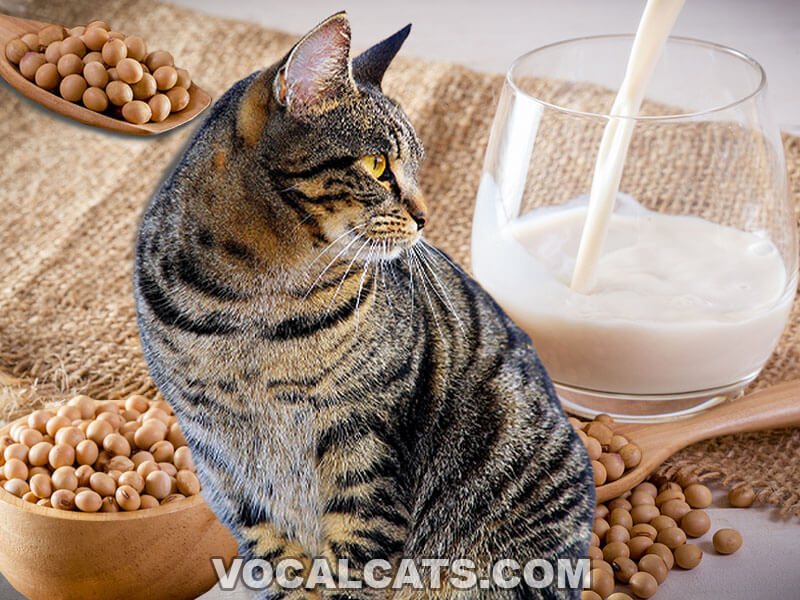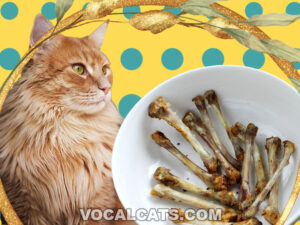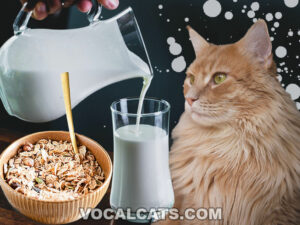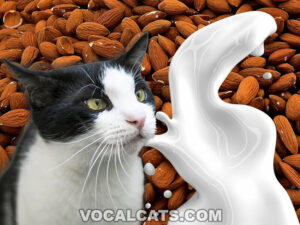Can Cats drink Soy Milk? No, cats cannot drink Soy Milk. While this is a lactose-free milk alternative, it still isn’t safe for cats because of two primary sugars found in Soy Milk: Stachyose and Raffinose. Humans can easily digest these compounds in their stomachs, but cats cannot, which is why drinking Soy Milk can lead to gastrointestinal upset in cats.
It’s becoming more well-known that cow’s milk isn’t the best option for cats even if pop culture tells us otherwise since most felines have a hard time digesting lactose. This is why many pet owners have started to look at non-dairy alternatives such as oat milk and Soy Milk.
If you’re drinking a cup of Soy Milk and your feline friends are begging you for some, you may start to wonder, “Can I give my cat Soy Milk?”
In this article, we’ll discuss why the answer to this question is a resounding no and why Soy Milk is not safe for cats even though it doesn’t contain lactose. We’ll delve deeper into what stachyose and raffinose are in Soy Milk and how they can harm your feline friends. Read on to learn more!
Contents
- Can Cats have Soy Milk?
- Is Soy Milk bad for Cats?
- Is Soy Milk good for Cats?
- Is Soy Milk safe for Cats?
- Is Soy Milk okay for Cats?
- Do Cats like Soy Milk?
- Can kittens Drink Soy Milk?
- Cats and Soy Milk
- Cats and Soy
- Are Cats supposed to drink Milk?
- What Milk is safe for Cats?
- So, Can Cats drink Soy Milk?
- Related Questions
Can Cats have Soy Milk?
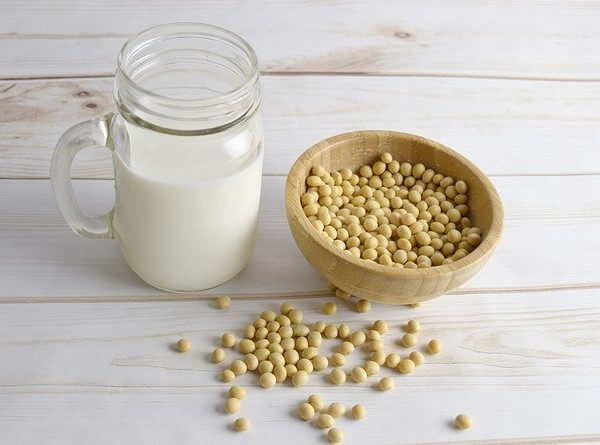
No, cats should not have Soy Milk. When you buy human-grade Soy Milk at your local grocery store or supermarket, you’ll find that it has many additives like sugar and sodium which can lead to obesity, diabetes, and even sodium poisoning in felines.
However, the main reason you should avoid giving your cat Soy Milk is because it contains two types of sugar, stachyose and raffinose which are usually found in most commercially-made Soy Milks.
The problem is that your fuzzy friends cannot digest these types of sugar, so drinking Soy Milk can cause gastrointestinal upset.
It isn’t uncommon for people to ask cat experts or veterinarian, “Can cats have Soya Milk?”
And regardless of which expert you ask, they will most likely tell you that it’s best to avoid feeding your feline friends Soy Milk.
While Soy Milk is primarily made of soybeans, there are other compounds raffinose and stachyose (sugars) that may not sit well in your cat’s stomach.
So, the next time you’re drinking a cup of Soy Milk, avoid sharing it with your fluffy companions and make sure to store the bottle or container in the refrigerator and out of your furry friend’s sight.
What is Soy Milk?
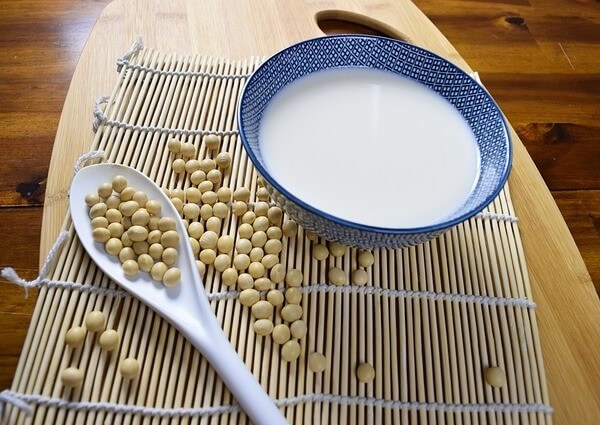
To better understand why your cat should not have Soy Milk, let’s talk about what makes up this drink. Soy Milk is fairly similar to oat milk, almond milk, and other non-dairy milk alternatives. As the name suggests, it’s primarily made out of soybeans.
Soy Milk is great non-dairy milk for us because of its high protein levels along with its omega-3 fatty acids which are essential for producing hormones that regulate blood clotting and inflammation.
However, it also contains sugar and compounds that your four-legged friends won’t be able to digest.
To give you a better idea of what Soy Milk is, let’s take a closer look at the ingredients and nutritional fact table for one cup or 240mL of commercial Soy Milk you can find at your local supermarket or grocery store.
Silk Soy Milk original nutrition facts (1 cup or 240mL)
| Name, Unit | Amount |
| Calories, cal | 110 |
| Total Fat, g | 4.5 |
| Saturated Fat, g | 0.5 |
| Polyunsaturated Fat, g | 2.5 |
| Monounsaturated Fat, g | 1 |
| Sodium, mg | 90 |
| Carbohydrate, g | 9 |
| Fiber, g | 2 |
| Sugar, g | 6 |
| Protein, g | 8 |
| Vitamin D, mcg | 3 |
| Iron, mg | 1.3 |
| Vitamin A, mcg | 150 |
| Folate, mcg | 40 |
| Phosphorous, mg | 220 |
| Calcium, mg | 450 |
| Potassium, mg | 380 |
| Riboflavin, mg | 0.4 |
| Vitamin B12, mcg | 3 |
| Magnesium, mg | 50 |
Silk original Soy Milk ingredients
- Soymilk (Filtered Water, Soybeans).
- Cane sugar.
- Vitamin and mineral blend (Tricalcium Phosphate, Calcium Carbonate, Vitamin A Palmitate, Vitamin D2, Riboflavin [B2], Vitamin B12).
- Sea salt.
- Natural flavor.
- Gellan gum.
Is Soy Milk bad for Cats?
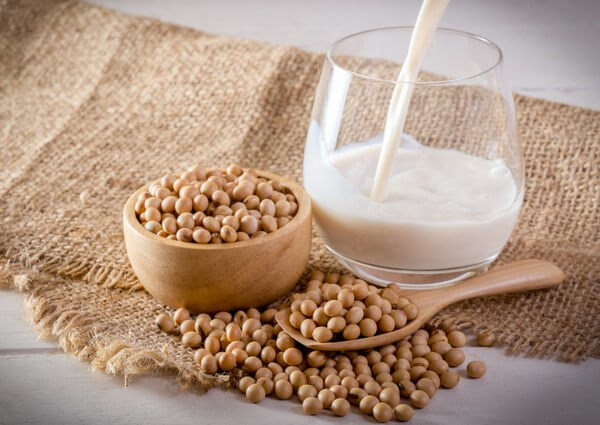
Yes, Soy Milk is bad for cats. If you’re drinking Soy Milk and you notice your cat is begging you for some, it’s best not to share this drink with him. That’s because Soy Milk can be dangerous to our fuzzy kitties. The Soy Milk contains sugar compounds like stachyose, which will upset your cat’s stomach.
Here are a few other reasons why Soy Milk is generally considered bad for cats.
Raffinose in Soy Milk can cause digestive issues and flatulence in cats
We know that Soy Milk is lactose-free milk which means they don’t contain lactose (milk sugar). However, they do possess similar types of sugar and one of them is raffinose.
One of the sugar compounds in Soy Milk is raffinose. Raffinose (RFOs) is a trisaccharide, a class of sugars whose molecules contain three (3) monosaccharide molecules: galactose, fructose, and glucose.
Unfortunately, monogastric animals such as cats and dogs (including us) do not have the α-GAL enzyme to break down raffinose. Therefore, raffinose will pass through the stomach and digestive system undigested.
As a result, your furry friends may experience the following symptoms:
- Vomiting.
- Upset stomach.
- Digestive issues.
- Flatulence.
Stachyose in Soy Milk can cause gastrointestinal issues in cats
Similar to raffinose, stachyose is another compound that our feline friends can not easily digest in their stomach and small intestines. When their stomach and digestive system can’t break it down, they may start to experience the following gastrointestinal issues:
- Vomiting.
- Diarrhea.
- Bloating.
- Abdominal pain.
If your kitties are prone to gastrointestinal issues, have sensitive stomachs, or suffers from inflammatory bowel disease, then it’s best to keep Soy Milk away from them. Even a few sips of Soy Milk can cause the above mentioned symptoms.
High sugar level in Soy Milk can lead to diabetes in cats
Another major concern when giving your cat Soy Milk is the high sugar level. If we take a look at the nutrition fact table of Silk Soy Milk, there are 6 grams of sugar in just one cup or 240mL of Soy Milk.
It’s important to keep in mind that our feline companions’ diet don’t require sugar. In fact, they don’t even have the taste buds to detect sugar so it’s unnecessary to feed them sugary human food or snacks.
Too much sugar consumption can lead to a whole host of health issues including weight gain, feline obesity, diabetes, and dental issues.
As we can see, that’s 6 grams of sugar that our cats don’t need. Due to this, it’s best to keep your Soy Milk away from your fluffy friends.
High fat level in Soy Milk can lead to feline obesity
If you take a look at the nutritional facts table again, you’ll see that one cup or 240mL of Soy Milk also contain 4.5 grams of fat. While that is not a lot of fat for us, it is sure a lot of fat for our small fur babies.
Excess fat intake can not only affect your cat’s health but also his lifespan. Cats should not have that much fat intake in their diet as this can put them at risk for the following health issues:
- Weight gain.
- Feline obesity.
- Diabetes mellitus.
- Various types of cancer.
- Hypertension.
- Heart disease.
- Cardiovascular issue.
- Affected joints may degenerate faster due to weight and pressure.
- Osteoarthritis.
As we can see, overweight or obese cats can experience extreme discomfort. Along with that, obesity puts cats a higher risk of cancer, diabetes, osteoarthritis, and cardiovascular disease.
High sodium level in Soy Milk puts your cat at risk for sodium poisoning
While Soy Milk does not taste salty, it does contain a good amount of sodium or salt. In fact, in just one cup or 240mL of Soy Milk, there are 90 mg of sodium. That’s a lot of sodium for our small kitties even though it doesn’t seem like a lot to us.
In fact, an average size cat should only have 21 mg of salt every day. When cats consume more than 41 mg of sodium a day, they are at risk of sodium poisoning.
Some signs and symptoms of sodium poisoning include:
- Vomiting.
- Extreme thirst.
- Frequent urination.
- Diarrhea.
- Lethargy.
- Loss of appetite.
- Loss of coordination.
- Muscle tremors.
- Seizures (in severe cases).
- Coma (in severe cases).
- Passing away (in severe cases).
If you suspect that your cat has sodium poisoning, we highly recommend that you contact your veterinarian right away and bring him to the nearest veterinary hospital as soon as you can. Sodium poisoning requires immediate medical attention.
At the veterinary hospital, the vet will perform a thorough physical exam and find out the severity of the sodium poisoning. In most cases, the vet will treat the excess sodium in the cat’s blood by administering intravenous (IV) fluids.
What the IV fluids will do is it will dilute the sodium in the blood and help to restore the sodium-water balance in your cat’s body.
IV fluid treatment is a slow process since drastically lowering the sodium level in your cat’s body can be dangerous and deadly. Therefore, your feline friends may have to stay at the hospital overnight.
Plant-based protein isn’t the same as animal-based protein
While we may see 8 grams of protein in one cup (240mL) of Soy Milk, this type of protein is considered plant-based protein.
Keep in mind that cats are obligate carnivores so they require animal-based protein and not plant-based protein.
We want to point out that plant-based protein does not equal animal-based protein. Why?
Because if we compare plant-based protein with animal-based protein, plant-based protein does not have the same amino acid profile as meat-based protein. For instance, meat-based proteins contain plenty of amino acids that our fuzzy friends need such as arginine, cysteine, methionine, and taurine.
Unfortunately, you won’t find taurine, arginine in plant-based proteins since it is only found in animal-based proteins.
To go through each briefly, cats with taurine deficiency may experience reproductive failure, loss in vision, and even dilated cardiomyopathy.
When it comes to the arginine amino acid, they are found in the tissues of animals. Thus, you won’t find this essential amino acid that our cats need in plant-based proteins. Cats with arginine deficiency may vomit and have hyperaesthesia, neurological abnormalities, salivation, involuntary muscle contractions, and even coma.
As we can see, protein from Soy Milk is not necessary to your cat’s diet. Since this milk also contains stachyose and raffinose, which our feline friends cannot digest properly, it’s best to keep this drink away from them.
Soy Milk doesn’t contain the nutrients your cat needs
Lastly, we don’t recommend giving your cats Soy Milk because it doesn’t contain the nutrients that they need to survive. Your cat won’t gain much from drinking Soy Milk, so it might be best kept as a human treat.
Is Soy Milk good for Cats?
No, Soy Milk is not good for cats. If you’re wondering, “is Soya Milk good for cats?” the answer is a resounding no. One thing to remember about Soy Milk is that there are certain compounds in it that your fuzzy friends won’t be able to digest like raffinose and stachyose.
However, there are some nutrients in Soy Milk that you may want to be aware of. We do want to preface that while Soy Milk does contain vitamins, minerals, and other nutrients, our fuzzy friends can receive them from their regular, well-balanced, and nutritious cat food. Our cats do not need Soy Milk to receive these necessary nutrients.
For now here are some nutrients in Soy Milk. We’ll explain how these nutrients can help benefit your feline friend’s health.
Vitamin A and D are present in Soy Milk
If we take a look at the nutritional fact table, we can see that there are 3mcg of vitamin D and 150mcg of vitamin A in just one cup of Soy Milk. So how does cats benefit from vitamin A and vitamin D? Let’s find out:
Vitamin A promotes healthy eyes and skin in cats
Vitamin A contains antioxidant properties which helps to fight against harmful free radicals (molecules that your cats’ body produces when they are exposed to radiation or smoke or when their body breaks down food).
When our fuzzy friends receive just the right amount of vitamin A, they will have healthy glowing skin and a strong immune system.
Let’s not forget that our cats also need sharp night vision. Vitamin A to the rescue! This vitamin helps to support the pigment formation that allows their eyes to see and adjust to changes in light. If your cat has night blindness or can’t see at night, then it can be a sign that he has vitamin A deficiency.
But how does vitamin A help support your feline friend’s immune system? Well, with enough vitamin A, the body will make white blood cells that looks for cellular irregularities and foreign bodies.
As we can see, vitamin A helps to fight off bacterial infections and viruses.
Did you also know that our kittens need vitamin A for proper growth and development? When they’re born, they rely on their mother’s milk which is fortunately rich in vitamin A. With enough vitamin A intake, the kittens will have proper growth rate and nervous system, strong muscles, and healthy skin and coat.
Vitamin D supports strong bones and healthy immune system in cats
Vitamin D is a fat-soluble vitamin which means that it helps your cat’s body absorb and hold onto phosphorus and calcium, both types of mineral that is crucial for maintaining strong bones. With just the right amount of Vitamin D, your cat is able to have the following:
- Healthy immune system.
- Proper nervous system function.
- Muscle movement.
- Healthy and strong bones.
Riboflavin (Vitamin B2) supports proper growth in cats
Riboflavin is also known as vitamin B2. In one cup of Soy Milk, there is 0.4mg of riboflavin.
Riboflavin is crucial because it promotes good health and proper growth in cats. With the right amount of vitamin B2, your cat’s body will be able to properly digest proteins, carbs, and fats in order to create energy and for the body to use the oxygen.
Additionally, vitamin B2 or riboflavin helps to improve your cat’s skin and hair as well as maintain a healthy metabolism.
Iron is required for proper growth and development in cats
Iron is another essential mineral that our fluffy companions need. Iron is necessary because it helps our cat’s body produce red blood cells, which carries oxygen throughout the body.
In general, cats naturally have enough iron in their bodies. However, cats with iron deficiency may have iron deficiency anemia. Cats with anemia or iron deficiency may experience the following symptoms:
- Lethargy.
- Vomiting.
- Pale gums.
If your fuzzy family member has iron deficiency, speak with your vet to find out if iron supplements may be required.
Soy Milk is lactose-free
Cats can’t drink many types of animal milk because of the lactose enzyme (milk sugar) found in these types of milk. That’s because our fuzzy companions don’t have the lactase enzyme in their system to break down lactose. Therefore, animal milk can cause gastrointestinal upset in cats.
Since Soy Milk is a lactose-free, it can be a great drink alternative to other types of milk products if your furry companion refuses to drink water.
Is Soy Milk safe for Cats?
No, Soy Milk is not safe for cats. It isn’t the safest treat option for cats because Soy Milk contains stachyose and raffinose, which our feline friends cannot digest properly in their stomach or small intestine.
So if you give your cat Soy Milk, hey may experience upset stomach and other gastrointestinal issues.
Is Soy Milk okay for Cats?
No, Soy Milk is not okay for cats. While Soy Milk does not contain lactose (a milk sugar that many cats struggle to digest because they lack the lactase enzyme to digest it properly), it does contain stachyose and raffinose.
Soy Milk naturally has these sugar compounds, which your cat can not digest at all. This is why if you give your cat Soy Milk, there’s a high chance that he might vomit, have upset stomach, diarrhea, and lethargy.
Do Cats like Soy Milk?
Cats are picky eaters with a very good instinct for what’s good for them and what isn’t. So, most cats will naturally avoid foods and treats that their body thinks won’t be good for them.
This is why there’s a high chance that your fuzzy friend will avoid you if you try to offer them Soy Milk.
Again, cats cannot naturally digest the stachyose and raffinose compounds in Soy Milk, which is why you might be better off keeping this drink away from them.
Even if your cat seems to like Soy Milk (which is rare), we’d still recommend keeping it away from him or her.
That’s because the gastrointestinal upset from Soy Milk can be very uncomfortable for him and might even require veterinary attention. Therefore, you’re better off finding other cat-friendly milk alternatives for your pet, which we will discuss more below.
Can kittens Drink Soy Milk?
Kittens are in a crucial state of growth and development and they require a very strict diet which includes their mother’s milk.
On top of that, their stomachs can be very sensitive, so the stachyose and raffinose compounds present in Soy Milk can greatly upset their stomachs.
As we know, kittens are much more fragile than adult cats as they lack the size and strength to survive on their own. This is why you need to pay extra close attention to what you’re feeding and giving them while they are young. Eating or drinking the wrong foods or snacks can greatly result in an emergency trip to the vet.
What about a small amount of Soy Milk? Can you give your kittens a small amount of Soy Milk? Even a small amounts of Soy Milk contain significant levels of raffinose and stachyose. Therefore, if you have a new kitten at home, we strongly advise that you keep them away from your Soy Milk.
Remember, just because it’s good for humans, doesn’t mean that it will be good for your kitten. If you want to keep your new kitten as safe and healthy as possible, it might be best to avoid giving them any Soy Milk.
Cats and Soy Milk
Cats and Soy Milk don’t have the best relationships. While there are some nutrients, vitamins, and minerals in Soy Milk that may benefit your cat, keep in mind that your fuzzy family members can receive them from their regular cat food.
This is why we recommend finding other feline-friendly milk substitutes for your little fur babies.
Can Cats Drink vanilla Soy Milk?
Vanilla Soy Milk is very similar to regular Soy Milk. The key difference is that vanilla Soy Milk has more sugar with vanilla flavor. While this makes the drink taste better for humans, it can make the Soy Milk even more dangerous for your feline companions.
As mentioned above, cats do not need sugar, especially when it comes from vanilla Soy Milk. Too much sugar consumption can lead to obesity, diabetes, and even diarrhea and vomiting in cats. Therefore, you’ll want to keep this drink away from your cat at all costs.
Can Cats Drink Soy or almond Milk?
Cats should not drink Soy Milk under any circumstances. Your cat cannot digest the stachyose and raffinose compounds in Soy Milk properly, which means that giving them Soy Milk can result in digestive problems and gastrointestinal issues in your cat.
That said, there are other lactose-free milk alternatives that may be a better option for your cat.
If you’re looking to give your cat a feline-friendly milk alternative, you may want to consider Almond Milk. As the name suggests, almond milk is made out of almonds. The good news is that almond milk isn’t inherently harmful to cats unless they have a nut allergy.
Therefore, make sure that you only give your cat unsweetened almond milk with no additives as some sweetened commercial almond milk brands have a lot of added sugar, which your cat shouldn’t have.
Additionally, even if almond milk is safe for your cat, keep in mind that moderation is key.
Cats and Soy
Cats should not have Soy Milk, and generally, the same goes for other soy products. In this section, we’ll take a closer look at whether or not cats can eat soy and other products derived from soybean.
Can Cats eat Soy?
Soy isn’t inherently dangerous or poisonous to cats. This means your cat should be able to have a little bit of soy without experiencing negative health effects. However, we still do not recommend that you feed soy to your cat.
To start, soybeans contains phytic acid, which absorbs important nutrients and minerals in your cats body. This could lead to a mineral deficiency which can cause liver disease in severe cases. Because of this, phytic acid is also sometimes referred to as an anti-nutrient.
Can Cats have Soy?
While cats can have a bit of soy, it isn’t recommended. Aside from the phytic acid, some cats may also be allergic to soy. An allergic reaction to soy is characterized by excessive itching, facial swelling, and hair loss.
On top of that, eating too much soy can cause gastrointestinal upset in your cat. Some cats experience diarrhea, vomiting, and nausea after eating soy and soy products, so it might be best to keep this away from your pet.
Is Soy bad for Cats?
Soy isn’t exactly bad for cats, but it isn’t good for them either. While soy and soy products have many health benefits for us, sadly, these benefits don’t extend to cats.
This is why when cats eat soy, there are at a greater risks for gastrointestinal upset and allergic reactions. So, we recommend looking for other healthier and natural treats for your cats instead.
Can Cats eat Soybeans?
Your cat can probably have a few soybeans, but only as a rare occasional treat. There aren’t many health benefits that your cat can get from soybeans, so the only reason you might want to give him some is if he like the taste.
But since soybeans can cause allergic reactions and upset your cat’s stomach, you don’t want to give him Soybeans too often.
Are Cats supposed to drink Milk?
Are you supposed to give cats milk?
Contrary to the media showing us that cats love a nice bowl of cow’s milk, it’s actually not a good idea to give our feline friends milk that isn’t from their mother. This is because most cats are actually lactose intolerant, so giving them cow’s milk may actually upset their stomach.
So, if you want to give your cat milk, it’s best to look for non-dairy alternatives. In the next section, we’ll go through a few types of non-dairy milk that you can give to your cat.
What Milk is safe for Cats?
We’ve already established that Soy Milk and cow’s milk aren’t ideal for your feline friends. So, are there other types of milk that are feline-friendly?
Fortunately, the answer is yes. There are quite a few milk alternatives that you can give your cat that can also offer quite a few health benefits. So, let’s look at a few of them.
Almond Milk
Almond milk is a great choice for cats. Almond milk contains a lot of vitamins A and E, which are essential for good eyesight and healthy skin and coat. This milk isn’t dangerous to cats, but only give it to them in moderation.
Pea Milk
Pea milk offers a great source of calcium and iron for your cat. But again, only give your cat pea milk in moderation.
Oat Milk
Oat milk is ideal for cats in small amounts or in moderation. This milk contains fiber which could help your fuzzy friend’s metabolism and digestion. However, too much can lead to stomach issues, so don’t give them a lot of pea milk.
Potato Milk
If you want to give your kitties milk, check out potato milk. It contains healthy fats and fiber for your cat.
Hemp Milk
Hemp milk is packed full of omega-3 fatty acids which makes them good for your cat’s general health and can help facilitate muscular development.
So, Can Cats drink Soy Milk?
If you want to give your cat a lactose-free, non-dairy milk alternative, Soy Milk is not the best option. This milk contains raffinose and stachyose, which most cats can’t digest properly. So, you might want to start looking at other milk options such as almond milk, oat milk, pea milk, or even hemp milk, as these are all much safer and better options for your feline friends.
Related Questions
No, Soya Milk or Soy Milk contains raffinose and stachyose, both of which your fuzzy companions can not digest properly. This is why drinking Soya Milk can cause stomach issues and other gastrointestinal problems in cats.
Yes, Soy Milk can be harmful to cats. Because it contains raffinose and stachyose, both of which your feline friend’s stomach and small intestines cannot properly digest. As a result, your kitties may experience gastrointestinal upset with symptoms like vomiting and diarrhea.
The best milk for cats is the one that comes from their mother. However, for adult cats, you can give them a bit of almond, oat, or pea milk as these are safe for feline consumption and offer quite a few health benefits for cats.
No, you shouldn’t give your cats Soy Milk because it contains certain compounds like raffinose and stachyose that may cause your cat to experience vomiting, nausea, diarrhea, and general gastrointestinal upset.
Cats cannot drink Soy Milk. If you do choose to give your fuzzy friends oat milk, do so in small quantities and in moderation because too much fiber intake can lead to an upset stomach.
DISCLAIMER: THIS WEBSITE DOES NOT PROVIDE MEDICAL ADVICE
The information, including but not limited to, text, graphics, images and other material contained on this website are for informational purposes only. No material on this site is intended to be a substitute for professional veterinary advice, diagnosis, or treatment. Always seek the advice of your veterinarian or other qualified health care provider with any questions you may have regarding dietary needs.
SILK is a registered trademark of WhiteWave Services, Inc. VocalCats does not claim any ownership of the SILK name, logo, or any identifying mark in any way. This article is for educational purposes only.
Resources:
https://www.ncbi.nlm.nih.gov/pmc/articles/PMC8891438/
https://en.wikipedia.org/wiki/Soy_milk
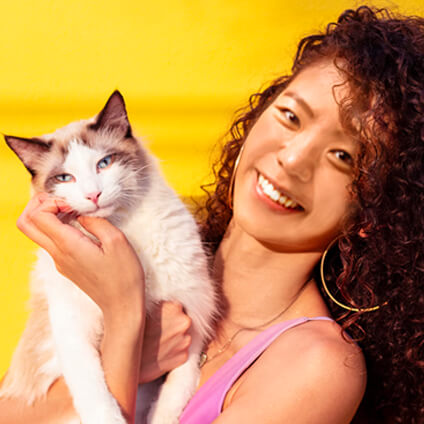
With over five years of specialized experience as an animal writer, my expertise lies in cat nutrition, health, behavior, grooming, and training. I am dedicated to delivering helpful and informative content that caters to the well-being of our feline friends. My primary goal is to empower pet owners with knowledge and ensure our feline companions thrive in health and happiness. In my free time, I love volunteering at local cat rescue centers.
